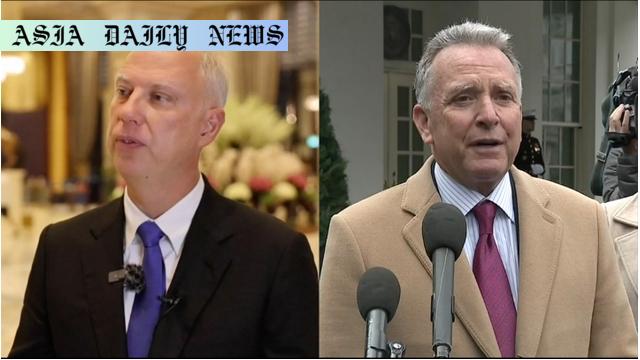Sanctions: Russian President Putin’s economic envoy Kirill Dmitriev meets with Trump’s ally in the US amid sanctions discussions.
Russian economic envoy Kirill Dmitriev visits the US despite sanctions.
Temporary waiver granted to Dmitriev for talks in Washington.
Discussions may involve Arctic exploration and Black Sea navigation.
The Trump administration seeks a ceasefire in Ukraine.
Russia ties Black Sea navigation deal to sanctions relief.

The Context: Dmitriev’s US Visit amidst Tensions
Russian President Vladimir Putin’s economic envoy, Kirill Dmitriev, has recently made headlines as he traveled to the United States to hold discussions with Steve Witkoff, a close ally of U.S. President Donald Trump. This marks a significant development as Dmitriev becomes the most senior Russian official to visit the U.S. since Russia’s 2022 invasion of Ukraine. Despite stringent sanctions barring Russian officials from the U.S., Dmitriev was granted a temporary waiver to make this critical visit. This event holds significant implications for international diplomacy, sanctions relief, and geopolitical negotiations.
Although the specifics of the discussions remain unclear, reports suggest that the talks might focus on bilateral cooperation involving rare earth minerals, Arctic energy exploration, and shipping routes. Furthermore, these discussions align with the Trump administration’s broader goal of securing an early ceasefire in the Ukraine conflict. Russia has reportedly linked substantial conditions to agreements on Black Sea navigation, urging sanctions relief in exchange for enabling safe maritime activities in the region.
Russia’s Strategic Intentions
Russia’s push for sanctions relief through Dmitriev’s diplomatic visit reflects a pragmatic approach amidst its ongoing economic challenges. Sanctions imposed by the international community have substantially strained Russia’s trade and financial activities. One of the focal areas under discussion relates to Arctic resources—an emerging zone of geopolitical contention given its untapped oil reserves and strategic shipping lanes. By proposing joint deals on Arctic exploration, Dmitriev aims to foster economic cooperation while subtly pushing for the softening of U.S. sanctions.
However, with the Trump administration adopting a cautious stance, tangible progress in negotiations may be limited. Trump’s recent frustration with Putin underscores the complexities of U.S.-Russia relations. Even as both sides explore mutual gains, fundamental differences on issues like Ukraine’s sovereignty remain a significant roadblock.
Potential Outcomes and Global Impact
The outcomes of Dmitriev’s visit carry profound implications for international relations and the ongoing conflict in Ukraine. A potential agreement on Arctic resource sharing could herald a new phase of U.S.-Russia economic cooperation. Simultaneously, resolving disputes over Black Sea navigation could improve humanitarian trade routes and alleviate regional tensions. However, such agreements will likely hinge on Russia’s willingness to make concessions, particularly regarding its demands for sanctions relief.
Meanwhile, the Trump administration faces a balancing act between advocating for Ukraine’s interests and addressing domestic political considerations. The perception of being overly conciliatory toward Russia could invite domestic criticism, adding further complexity to these sensitive negotiations. It remains to be seen whether Dmitriev’s visit lays the groundwork for meaningful breakthroughs or becomes another chapter in an enduring stalemate.
Broader Geopolitical Ramifications
The implications of this visit transcend U.S.-Russia relations. If successful, the talks could serve as a blueprint for other sanctioned nations seeking diplomatic channels to negotiate economic relief. Furthermore, the focus on Arctic cooperation highlights the growing importance of the region as a key frontier in resource politics. The outcomes could also shape how other global players, such as China and European nations, engage with Russia in the context of ongoing sanctions. As such, the world watches closely as these high-stakes discussions unfold.
Commentary
Diplomatic Balancing Act
The recent visit of Kirill Dmitriev to the U.S. is emblematic of the intricate web of diplomatic efforts required to address the lingering consequences of the Ukraine conflict. On one hand, this visit signifies Russia’s willingness to engage in dialogue and explore economic cooperation with its Western counterparts. On the other, it highlights just how critical sanctions relief is to Russia’s economic strategy. Dmitriev’s temporary waiver is noteworthy, as it reflects the careful consideration given to balancing international diplomacy with adherence to sanctions policies.
The Role of Economic Incentives
Economic cooperation, particularly regarding rare earth minerals and the Arctic region, could pave the way for gradual thawing of relations between these two powerful nations. Dmitriev’s focus on energy exploration and strategic shipping routes in the Arctic is particularly telling, as it underscores the economic priorities driving Russia’s global interactions. For the U.S., these discussions offer an avenue to potentially influence Russia’s policies by tying any agreements to tangible progress in resolving the Ukraine crisis.
Challenges and Opportunities
Yet, significant obstacles remain. The Trump administration’s frustration with Putin hints at underlying tensions that could impede progress. Furthermore, the perception of appeasing Russia in exchange for economic interests might draw criticism from both domestic and international stakeholders. The conditions attached to the Black Sea navigation deal reflect these complexities, demonstrating how intertwined economic, political, and humanitarian considerations have become.
Global Implications
Dmitriev’s visit is more than a bilateral affair; it represents a microcosm of the intricate dynamics shaping modern geopolitics. By addressing key issues like resource sharing and sanctions, these discussions could have ripple effects beyond the U.S. and Russia, influencing global norms on economic diplomacy. While it remains uncertain whether this visit marks the beginning of a breakthrough or merely a tactical maneuver, its broader implications will undoubtedly shape our understanding of international relations in the years to come.


